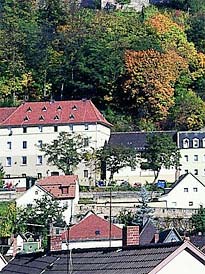|
|
 |
 |
 |
|
 Kulmbach Kulmbach
Plassenburg Castle |
|
In 1192 Burgrave Friedrich of Nuernberg laid the foundations for the rise of the Hohenzollern family.
From 1248 to 1331 the Hohenzollern increased their dominion: the cities of Bayreuth, Kulmbach and Ansbach passed into their possession. In 1363 the elevation of the Hohenzollern to free princes took place.
To avoid fragmentation of the property Friedrich V enacted a division of the country into two parts the so-called "Oberland” (Upper Country) and "Unterland” (Lower Country) in 1385. |
|
 |
|
|
|
 |
|
His son Friedrich VI came into possession of the "Unterland” including the cities of Cadolzburg and Ansbach. His son Johann III received "Oberland”.
Burgrave Friedrich VI, from 1415 on Margrave of Brandenburg and now elector Friedrich I., left Brandenburg in 1426 to attend to his Franconian regions. To his eldest son Johann der Alchimist (the Alchemist) he assigned "Oberland” including the cities of Kulmbach, Bayreuth and Erlangen. His third eldest son Albrecht Achilles received at first Ansbach, then Kulmbach and finally Brandenburg. His son Albrecht IV the elder preferred to reside in Plassenburg castle. Here he lived together with eight squires and 29 noblewomen, five chaplains and 15 clerks.
In 1604 the residence was relocated to Bayreuth. During the regency of Margrave Wilhelmine "Oberland” underwent a period of cultural glory in the 18th century.
With the abdication of Margrave Christian Friedrich Carl Alexander in 1791 the seal was set on the history of "Oberland” and "Unterland”. |
|
|
|
|
|

|
|
|
|
Local History of Kulmbach |
|
9th century: A Franconian burial ground proves the settlement of the Kulmbach area in the Early Middle Ages.
1035: Kulmbach is proved by documents first.
Around 1230: Plassenburg castle is enlisted on the so-called medieval Ebstorfer World Map.
On 26th November 1553 after Albrecht Alcibiades had met his Waterloo in Margraves’ War Kulmbach was burnt down and plundered by troops of the confederation estates. A little later Plassenburg castle surrendered. |
|
|
|
|






